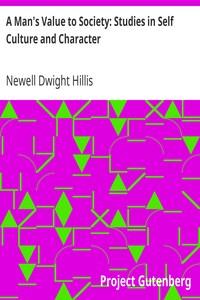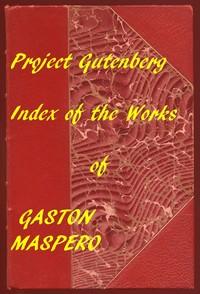Read this ebook for free! No credit card needed, absolutely nothing to pay.
Words: 64713 in 14 pages
This is an ebook sharing website. You can read the uploaded ebooks for free here. No credit cards needed, nothing to pay. If you want to own a digital copy of the ebook, or want to read offline with your favorite ebook-reader, then you can choose to buy and download the ebook.


: A Man's Value to Society: Studies in Self Culture and Character by Hillis Newell Dwight - Character; Self-culture
ought. Once Italy and Greece and Central Europe made one vast storehouse filled with precious art treasures. But men turned the cathedrals into arsenals of war. If the clerks in some porcelain or cut-glass store should attend to their duties in the morning, and each afternoon have a pitched battle, during which they should throw the vases and cups and medallions at each other, and each night pick up a piece of vase, here an armless Venus and there a headless Apollo, to put away for future generations to study, we should have that which answers precisely to what has gone on for centuries through hatreds and class wars. An outlook upon society is much like a visit to Lisbon after an earthquake has filled the streets with debris and shaken down homes, palaces, and temples. History is full of the ruins of cities and empires. Not time, but disobedience, hath wrought their destruction. New civilizations will be reared by coming generations; uprightness will lay the foundations and integrity will complete the structure. The temple is righteousness in which God dwelleth.
FOOTNOTES:
Northampton Antiquities. Clark.
CHARACTER: ITS MATERIALS AND EXTERNAL TEACHERS
CHARACTER: ITS MATERIALS AND EXTERNAL TEACHERS
Dying, Horace Greeley exclaimed: "Fame is a vapor, popularity an accident, riches take wings, those who cheer to-day will curse to-morrow, only one thing endures--character!" These weighty words bid all remember that life's one task is the making of manhood. Our world is a college, events are teachers, happiness is the graduating point, character is the diploma God gives man. The forces that increase happiness are many, including money, friends, position; but one thing alone is indispensable to success--personal worth and manhood. He who stands forth clothed with real weight of goodness can neither be feeble in life, nor forgotten in death. Society admires its scholar, but society reveres and loves its hero whose intellect is clothed with goodness. For character is not of the intellect, but of the disposition. Its qualities strike through and color the mind and heart even as summer strikes the matured fruit through with juicy ripeness.
Of that noble Greek who governed his city by unwritten laws, the people said: "Phocion's character is more than the constitution." The weight of goodness in Lamartine was such that during the bloody days in Paris his doors were unlocked. Character in him was a defense beyond the force of rock walls or armed regiments. Emerson says there was a certain power in Lincoln, Washington and Burke not to be explained by their printed words. Burke the man was inexpressibly finer than anything he said. As a spring is more than the cup it fills, as a poet or architect is more than the songs he sings or the temple he rears, so the man is more than the book or business he fashions. Earth holds many wondrous scenes called temples, battle-fields, cathedrals, but earth holds no scene comparable for majesty and beauty to a man clothed indeed with intellect, but adorned also with integrities and virtues. Beholding such a one, well did Milton exclaim: "A good man is the ripe fruit our earth holds up to God."
Character has been defined as the joint product of nature and nurture. Nature gives the raw material, character is the carved statue. The raw material includes the racial endowment, temperament, degree of vital force, mentality, aptitude for tool or industry, for art or science. These birth-gifts are quantities, fixed and unalterable. No heart-rendings can change the two-talent nature into a ten-talent man. No agony of effort can add a cubit to the stature. The eagle flies over the chasm as easily as an ant crawls over the crack in the ground. Shakespeare writes Hamlet as easily as Tupper wrote his tales. Once an oak, always an oak. Care and culture can thicken the girth of the tree, but no degree of culture can cause an oak bough to bring forth figs instead of acorns. Rebellion against temperament and circumstance is sure to end in the breaking of the heart. Happiness and success begin with the sincere acceptance of the birth-gift and career God hath chosen.
Since no man can do his best work save as he uses his strongest faculties, the first duty of each is to search out the line of least resistance. He who has a genius for moral themes but has harnessed himself to the plow or the forge, is in danger of wrecking both happiness and character. All such misfits are fatal. No farmer harnesses a fawn to the plow, or puts an ox into the speeding-wagon. Life's problem is to make a right inventory of the gifts one carries. As no carpenter knows what tools are in the box until he lifts the lid and unwraps one shining instrument after another, so the instruments in the soul must be unfolded by education. Ours is a world where the inventor accompanies the machine with a chart, illustrating the use of each wheel and escapement. But no babe lying in the cradle ever brought with it a hand-book setting forth its mental equipment and pointing out its aptitude for this occupation, or that art or industry. The gardener plants a root with perfect certainty that a rose will come up, but no man is a prophet wise enough to tell whether this babe will unfold into quality of thinker or doer or dreamer. To each Nature whispers: "Unsight, unseen, hold fast what you have." For the soul is shadowless and mysterious. No hand can carve its outline, no brush portray its lineaments. Even the mother embosoming its infancy and carrying its weaknesses, studying it by day and night through years, sees not, she cannot see, knows not, she cannot know, into what splendor of maturity the child will unfold.
Man beholds his fellows as one beholds a volume written in a foreign language; the outer binding is seen, the inner contents are unread. Within general lines phrenology and physiognomy are helpful, but it is easier to determine what kind of a man lives in the house by looking at the knob on his front door than to determine the brain and heart within by studying the bumps upon face and forehead. Nature's dictum is, "Grasp the handle of your own being." Each must fashion his own character. Nature gives trees, but not tools; forests, but not furniture. Thus nature furnishes man with the birth materials and environment; man must work up these materials into those qualities called industry, integrity, honor, truth and love, ever patterning after that ideal man, Jesus Christ.
The influences shaping nature's raw material into character are many and various. Of old, the seer likened the soul unto clay. The mud falls upon the board before the potter, a rude mass, without form or comeliness. But an hour afterwards the clay stands forth adorned with all the beauty of a lovely vase. Thus the soul begins, a mere mass of mind, but hands many and powerful soon shape it into the outlines of some noble man or woman. These sculptors of character include home, friendship, occupation, travel, success, love, grief and death.
Life's first teacher is the external world, with its laws. Man begins at zero. The child thrusts his finger into the fire and is burned; thenceforth he learns to restrain himself in the presence of fire, and makes the flames smite the vapor for driving train or ship. The child errs in handling the sharp tool, and cuts himself; thenceforth he lifts up the axe upon the tree. The child mistakes the weight of stone, or the height of stair, and, falling, hard knocks teach him the nature and use of gravity. Daily the thorns that pierce his feet drive him back into the smooth pathway of nature's laws. The sharp pains that follow each excess teach him the pleasures of sound and right living. Nor is there one infraction of law that is not followed by pain. As sharp guards are placed at the side of the bridge over the chasm to hold men back from the abyss, so nature's laws are planted on either side of the way of life to prick and scourge erring feet back into the divine way. At length through much smiting of the body nature forces the youth into a knowledge of the world in which he lives. Man learns to carry himself safely within forests, over rivers, through fires, midst winds and storms. Soon every force in nature stands forth his willing servant; becoming like unto the steeds of the plains, that once were wild, but now are trained, and lend all their strength and force to man's loins and limbs.
Free books android app tbrJar TBR JAR Read Free books online gutenberg
More posts by @FreeBooks

: Comments on the Taxonomy and Geographic Distribution of Some North American Rabbits by Hall E Raymond Eugene Raymond Kelson Keith R - Rabbits; Mammals North America


: Track's End Being the Narrative of Judson Pitcher's Strange Winter Spent There as Told by Himself and Edited by Hayden Carruth Including an Accurate Account of His Numerous Adventures and the Facts Concerning His Several Surprising Escapes from Death Now


: History of Egypt Chaldæa Syria Babylonia and Assyria A Linked Index to the Project Gutenberg Editions by Maspero G Gaston Widger David Editor McClure M L Translator - History Ancient; Middle East History; Egypt History To 640 A.D.; Civilization Ancient;




